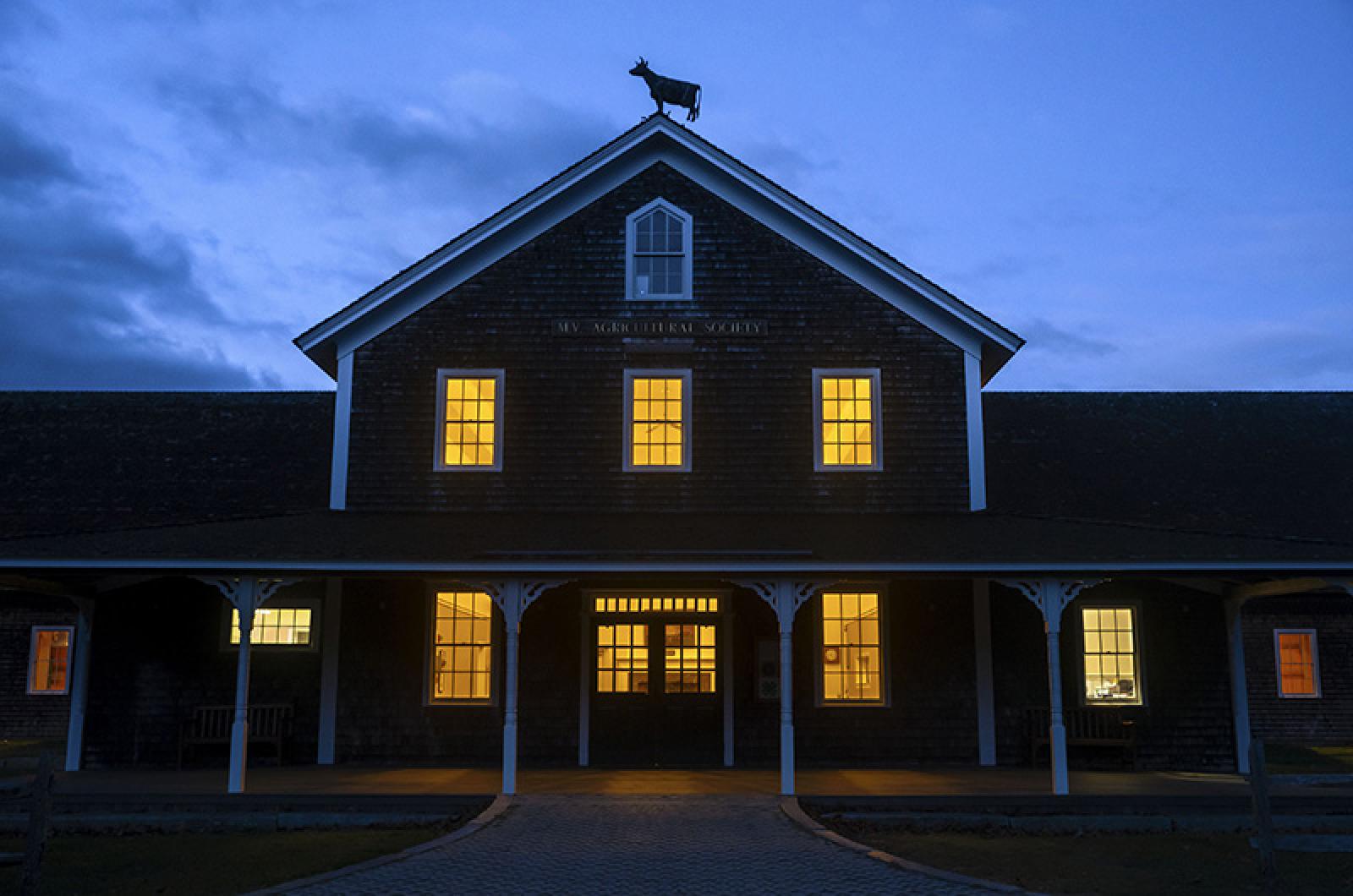Appropriate uses for the West Tisbury Agricultural Hall, including what type of events can be allowed on the deed-restricted property that lies in the rural agricultural heart of the Island, dominated discussion at a packed meeting of the town selectmen Wednesday.
Members of the Martha’s Vineyard Agricultural Society who attended the meeting said they rely on events for revenue and sought permission to host more weddings, as well as more clarity from the town on the event permitting process.
“The agricultural hall is a community resource like no other facility on the Island with its size, central location and parking,” board member Bob Egerton said in a statement. “Because of our small staff and volunteer board, we need a streamlined process to approve new events.”
Issues around use of the Ag Hall have surfaced periodically since the society acquired the 23-acre parcel in 1993. The tract of land originally belonged to longtime Island conservationists Edwin and Jeanne Woods. The Woods family sold the land to the society at a discounted price for a new fairground and headquarters, but put clear restrictions in place to ensure that the property would be limited to agricultural and educational use.
In 1991 before the sale was complete, the Woods family also donated an agricultural preservation restriction (APR) for the property which is held jointly by the town conservation commission and the Vineyard Conservation Society (VCS). The restriction stipulates that the Panhandle Road property can only be used for purposes traditionally associated with the agricultural society, which dates to 1859 and was previously housed at the Grange Hall in the center of town.
Historical purposes associated with the agricultural society include the annual agricultural fair, cattle shows, and educational events among other activities. Some limited commercial activities are allowed.
Discussion on Wednesday was initially prompted by the recent permitting process for the October Fresh off the Farm event, held at the hall and co-hosted by the Martha’s Vineyard Food and Wine Festival and the agricultural society.
But West Tisbury town administrator Jen Rand said the meeting was an opportunity to talk about permitting as a new generation of agricultural society leaders takes the helm.
“The Ag society has had a change in office and a change in leadership, and everybody needs to figure out how to go forward,” Ms. Rand said.
The meeting included representatives from the agricultural society, VCS, the town, and other Island organizations. Town counsel Ron Rappaport also attended.
Some agricultural society representatives said the permitting process for events at the hall is burdensome and needs to be streamlined. Currently, every event needs a separate sign-off from multiple town departments including the board of health, police, fire and zoning.
Mr. Egerton outlined the society’s lean finances, noting that many of the organization’s programs, such as 4H meetings, generate no revenue. He said
the annual four-day Agricultural Fair accounts for 74 per cent of annual revenue. He also said while the society has more than 2,000 members, all but about 10 per cent of those members paid a one-time membership fee to join and pay no annual dues.
“The Ag society operates at a very modest profit,” Mr. Egerton said. He said the society also has mortgages from a 2012 purchase of adjoining land and the construction of a one-acre solar array, which he said is now generating income.
“Interest on the mortgages needs to be paid, so a steady source of revenue is needed,” Mr. Egerton said. He said expensive facilities repairs are on the horizon, including for the roof and shingling on the building that was constructed from the frame of an antique barn. To increase revenue, Mr. Egerton asked that the society be allowed to host eight weddings per year, two more than the six currently allowed.
“The income generated directly supports our agricultural and educational programming,” he said.
Mr. Rappaport said while the Ag society is clearly an important part of the community, its financial needs are not a town concern. But he said upholding the expectations set forth by the Woods family is.
“The issue of buying adjoining property has nothing to do with the APR,” Mr. Rappaport said. And he said any change to the limit on weddings would be a zoning issue.
From the outset, all agreed that altering the deed restriction was off limits.
“This is not a conversation about any changes in the terms of the APR,” selectman and board chairman Cynthia Mitchell said.
“We have no agenda to change the APR. As a matter of fact, we want to adhere to it vehemently,” Ag society president Brian Athearn said.
In the end society members and selectmen agreed that the society would present a list of events at the beginning of the year for review by a working group that includes all the stakeholders — including the conservation commission and VCS.
“I think the involvement of the APR holders is critical here, because they are really the protectors of the Woods’s intentions,” Mrs. Mitchell said.
The working group will consider the wedding cap as well as other issues such as beer and wine licenses for events and whether the society can co-host events with other Island organizations.
West Tisbury painter and farmer and agricultural society board member Allen Whiting said he believed a flourishing agricultural society was part of the late Bob and Jeanne Woods’s vision for their property.
“How Bob and Jeanne would feel, I don’t know, but I do know they loved the town and would try and support the agricultural society,” Mr. Whiting said.







Comments (6)
Comments
Comment policy »